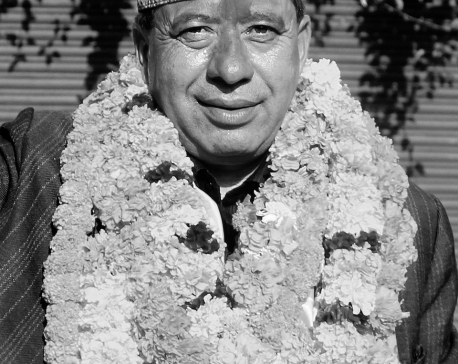
OR
Former lawmaker Bhetwal passes away
Published On: April 4, 2018 06:08 PM NPT By: Republica | @RepublicaNepal
CHITWAN, April 4: CPN (UML)'s central audit committee member and former lawmaker Jagrit Prasad Bhetwal of Rapti Municipality-4, Chitwan passed away today.
Bhetwal was suffering from the cancer of prostate gland and had died in course of treatment at the Bir Hospital, Kathmandu a while ago, said Jagannath Thapaliya, CPN (UML) Chitwan's former (district) chair. He was admitted to the hospital one and half months ago after the cancer spread to other body parts as well. He is survived by his spouse, two daughters and a son. RSS
You May Like This

Former lawmaker Bhetwal passes away
RATNANAGAR, Chitwan, April 4: CPN (UML)'s central audit commission member and former lawmaker Jagrit Prasad Bhetwal of Rapti Municipality-4, Chitwan... Read More...

Former lawmaker Pangeni passes away
SYANGJA, Aug 5: Former lawmaker from the Nepali Congress (NC) and Syangja district chapter president of the party, Kamal Prasad... Read More...

Lawmaker Limbu passes away
KATHMANDU, June 25: CPN-UML central committee member and lawmaker Mahin Limbu passed away on Saturday night. ... Read More...




Just In
- CM Kandel requests Finance Minister Pun to put Karnali province in priority in upcoming budget
- Australia reduces TR visa age limit and duration as it implements stricter regulations for foreign students
- Govt aims to surpass Rs 10 trillion GDP mark in next five years
- Govt appoints 77 Liaison Officers for mountain climbing management for spring season
- EC decides to permit public vehicles to operate freely on day of by-election
- Fugitive arrested after 26 years
- Indian Potash Ltd secures contract to bring 30,000 tons of urea within 107 days
- CAN adds four players to squad for T20 series against West Indies 'A'














Leave A Comment